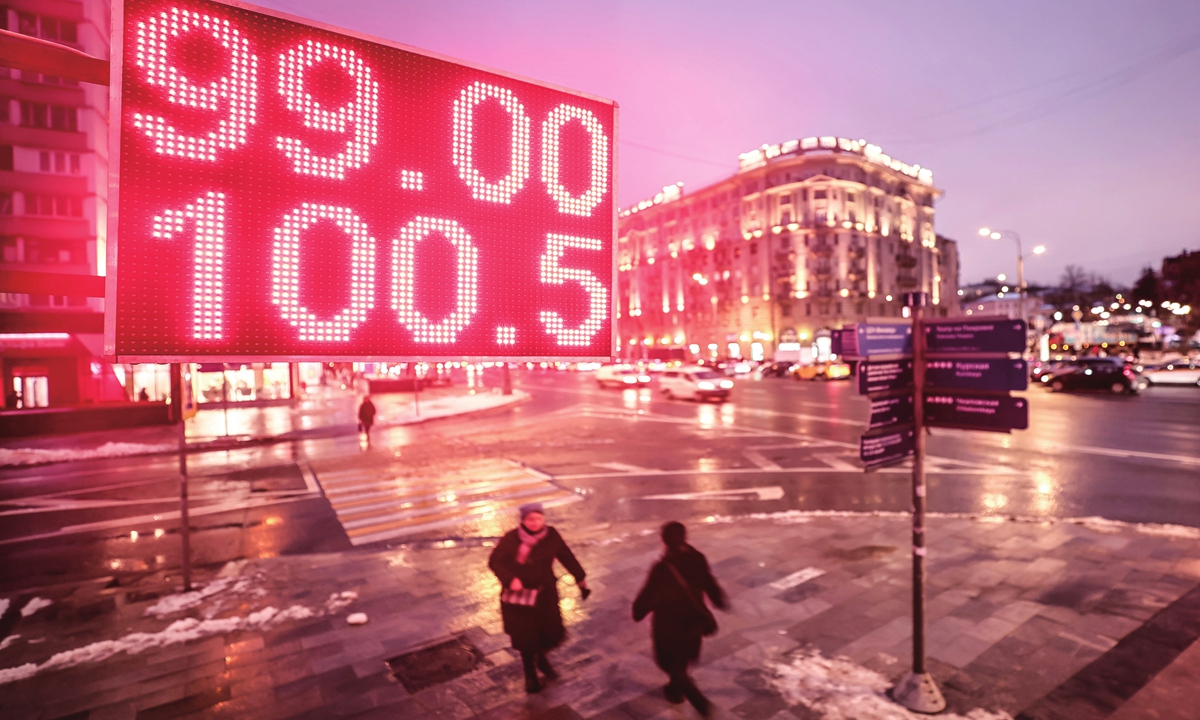

Information board showing foreign currency exchange rates in Moscow Photo: VCG
Editor's Note: As the world reflects on the Russia-Ukraine conflict on Saturday, its second anniversary, the long-term implications of the ongoing military conflict and the impact of Western countries' sanctions against Russia on the world economy and international market remain topics of great concern. What kind of medium- to long-term effects will the conflict and the sanctions have on the already struggling global economy? The Global Times invited Djoomart Otorbaev, the former prime minister of Kyrgyzstan, to share his perspective.The US and several European countries have taken action by freezing Russia's financial reserves following the start of military operations in Ukraine. According to the European Commission, more than $288 billion of Russian assets remain in the G7 countries, the EU and Australia, of which 200 billion euros ($217 billion) is in the EU, mainly in Belgium.
However, this move could potentially cause harm to the global financial system's stability and the vital role of the US dollar.
Moscow has argued that the confiscation of Russian sovereign assets is illegal and has repeatedly said it will challenge any confiscation in international courts.
Russia has also warned that if Western countries confiscate its assets, it will retaliate by seizing Western assets still held in Russia, which by some estimates amount to approximately $288 billion.
It argues that it obtained these funds legally by exporting its goods to other countries.
Even Sergei Aleksashenko, former deputy chairman of the Central Bank of Russia and a formidable political opponent of the current Russian government, specifically emphasized this.
"I do not believe that there is any way to confiscate the assets of the Russian central bank without a court decision ... and if this is done by decision of the administration, it means that in the US, there is no rule of law and no protection of private property."
The US Senate Committee on Foreign Relations recently passed the Rebuilding Economic Prosperity and Opportunity Act for Ukrainians.
This legislation would provide the executive branch with the power to seize Russia's frozen sovereign assets in the US and transfer them to Ukraine. Many agreed that this move could be a strategic mistake as it may decrease the likelihood of peace.
US President Joe Biden has recently faced criticism from the media for releasing some of Iran's frozen assets in exchange for the release of five American citizens. It is improbable that he - or a future US president - will make a similar decision regarding Russia.
The possible confiscation of Russian assets could become a legal trigger for similar actions in other conflicts. The US government may face legal responsibility for unauthorized invasions into Afghanistan, Iraq and Libya. Based on similar legal cases, there is a possibility that other parties could look to confiscate the properties of US individuals and businesses through court proceedings.
Confiscating Russian assets could have severe negative consequences for the ongoing conflict in Ukraine. Instead of seizing the assets, they could be frozen and returned as part of a more extensive peace process. This approach would increase the chances of reaching a compromise and ending the conflict.
If Western countries decide to confiscate Russian assets, it will decrease the chances of successful negotiations and compromises. As a result, Moscow may demand additional political, economic and territorial concessions from Ukraine and its Western allies to make up for the financial losses.
Therefore, it is crucial for the West to carefully consider the consequences of any decision to seize Russian assets when planning and conducting future peace negotiations. As Russia becomes more confident of its military success, returning the frozen Russian state assets could be a valuable bargaining tool for the West to achieve a successful peace agreement.
Confiscating financial assets while Ukraine concedes on the battlefield will push Russia to seize more territory to compensate for financial losses in future negotiations.
The top priority now should be to end the conflict as soon as possible. However, confiscating Russian assets could fundamentally hinder the progress toward achieving peace.
It has become evident that the seizure of Russian assets by the allies will cause other nations to reconsider holding their assets in dollars and euros. This action has led many countries to explore alternative options.
Some European officials realize the potential consequences of confiscation for the stability of the euro. They fear that some states and private investors may withdraw from euro-denominated assets due to concerns that they may one day be confiscated for political reasons.
EU governments are only discussing the European Commission's proposal from December, which suggested using only the profits from these assets while leaving the principal amount untouched. It will allow about 15-17 billion euros to be transferred to Ukraine over four years.
Although this mechanism is also illegal, it is believed that juggling such numbers will not be the most severe obstacle in future peace negotiations.
Throughout history, there have been several instances where economic conflicts transformed into full-fledged wars.
For example, in 1807, the US imposed an embargo on France and England as a punitive measure for their naval aggression, ultimately resulting in the War of 1812. Similarly, when US President Franklin Roosevelt froze Japan's sovereign assets and imposed an embargo on oil and gasoline exports, it led to Japan's decision to attack Pearl Harbor.
Western politicians frequently repeat the phrase "rules-based international order." However, their actions often contradict their words, as evidenced by their willingness to confiscate a sovereign state's assets. The rules-based order only works if those who promote it follow the same rules and norms they impose on others.
The author is the former prime minister of Kyrgyzstan, a distinguished professor of the Belt and Road School of Beijing Normal University, a member of Nizami Ganjavi International Centre, and the author of the book "Central Asia's Economic Rebirth in the Shadow of the New Great Game." bizopinion@globaltimes.com.cn
